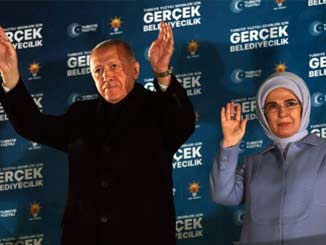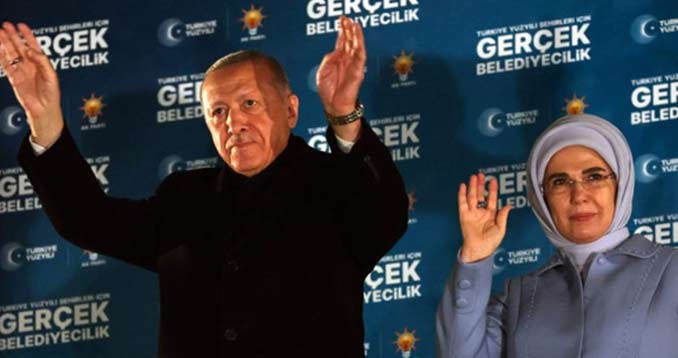

Hasht-E Subh Turkey, as a prime example of Middle Eastern democracy, witnessed municipal elections this week. The fact that even local elections in this country make headlines worldwide speaks to its special status in the Middle East, particularly in the Islamic world, which also underscores its commitment to democracy. However, serious criticisms of Turkish democracy, particularly regarding the ruling style of the Justice and Development Party (AKP), persist. The significance of municipal elections in this country cannot be understated, even if they don’t directly correlate with presidential or parliamentary elections.
The extensive coverage of local elections and candidates’ campaigns in global media is indicative of their importance. Therefore, Recep Tayyip Erdogan, the President of Turkey, sought to push his rivals back and emerge victorious, akin to his successes in presidential and parliamentary elections.
Despite his party’s previous victories, which could render municipal elections inconsequential, Erdogan still strived to maintain a considerable hold on power. However, his party’s efforts did not lead to success; rather, they suffered setbacks, leading many to label it as a “heavy defeat.”
Among all cities, Istanbul held pivotal importance for Erdogan. He is famously quoted as saying, “Whoever wins Istanbul, wins Turkey.” Erdogan, a native of Istanbul, has traversed through politics in this metropolis, serving as mayor, party leader, prime minister, and ultimately, president. Erdogan served as the mayor of Istanbul from 1994 to 1998, and the significance of this position for him surpasses that of anyone else. It is claimed that his tenure as mayor served as a springboard for his ascent to power. Now that Ekrem Imamoglu, a member of the opposition Republican People’s Party (CHP), serves as the mayor of Istanbul, many speculate that he might become the strongest contender in the 2028 presidential elections, potentially marking the end of Erdogan’s rule. If not for his role as mayor, Imamoglu’s name might not have been so prominent.
Istanbul’s significance extends beyond politics to trade and economics. Internationally, Turkey is often synonymous with Istanbul. It is also the primary destination for foreign tourists. Istanbul even surpasses Ankara, Turkey’s capital, in importance. Reports suggest Istanbul has a population of close to 16 million and an annual budget ranging from 10 to 15 billion dollars, compared to Ankara’s approximately 3 billion dollars.
The Justice and Development Party held exclusive control over the Istanbul municipality from 1994 until June 2019. During that time, Ankara’s municipality was also under the control of this party and its affiliated figures. However, in 2019, the tide turned against Erdogan’s party, with the opposition Republican People’s Party winning in both critical cities. That year, Ekrem Imamoglu, representing the Republican People’s Party, defeated the AKP candidate, Binali Yildirim, in the Istanbul mayoral election. Although Imamoglu won the election, the ruling party maneuvered to hold a rerun of the Istanbul elections.
Once again, Imamoglu emerged victorious with even more significant support than in the initial round. Similarly, Mansur Yavas, representing the Republican People’s Party, won the mayoral election in Ankara that year, maintaining his position until now.
In the elections held on Sunday of this past week, once again Ekrem Imamoglu emerged victorious in Istanbul, defeating his rival Murat Kurum (also spelled Murat Korum in some places) from the Justice and Development Party (AKP) with a 10% margin. In Ankara, Mansur Yavas maintained his seat, defeating the AKP candidate, Turgut Alpinoğlu. In Izmir, the third-largest city in Turkey, Jamil Togay from the Republican People’s Party surpassed Hamza Dag from the AKP. Erdogan’s party also suffered defeats in the fourth and fifth largest cities in Turkey (Bursa and Antalya). Although Erdogan’s party lost the mayoral elections in Istanbul and Ankara in 2019, it still held the top position. However, this time, with 35.4% of the total votes, it fell to the second rank, while its competitor rose to the first rank with 37.7% of the votes. In 2019, the Republican People’s Party had 26% of the votes, while the AKP had 43%.
The Republican People’s Party, focused on preserving its existing seats, not only maintained its positions but also gained ground. In contrast, Erdogan’s party, aiming to increase its holdings, not only failed to make gains but also lost ground. After twenty years, it’s the first time the AKP has been relegated to the second tier. Consequently, talks of a heavy defeat abound. It was widely presumed that Erdogan’s party, which had won the previous two elections with ease, would simply seize control of the municipalities again, but it failed to do so. This situation, as Erdogan himself admitted, speaks to weaknesses and shortcomings that, if not addressed in the future, could render his party’s presence in Turkish politics less impactful or even ineffective.
Considering the aforementioned points, two questions arise:
1 – Why did Erdogan’s party suffer setbacks?
Firstly, many believe that Turkey’s unfavorable economic situation could be a significant factor. Turkey is an industrialized and developed country, and its people mostly live a European-style lifestyle. Therefore, they cannot remain indifferent to even minor economic shortcomings. It’s not as though the public would turn a blind eye to high inflation and unemployment rates just because other poor countries experience them. Turkey’s economy has been declining for several years now, although it’s a multifactorial issue. Erdogan, who assumed the presidency with an economic-focused approach, has yet to address the matter adequately. Reports indicate that inflation in Turkey is hovering around 70% these days. Additionally, before Erdogan’s third term in office, the value of 1 US dollar was equivalent to 19 Turkish Liras, but now it has risen to 32 Liras. This situation indicates economic malaise in Turkey, for which Erdogan’s prescriptions have proven ineffective. The AKP had previously navigated Turkey’s economy through narrow straits of crisis and inflation to prosperity, and this was also a reason for its past victories. However, now that the factor that led to victory has turned into a reason for failure, it’s worth reflecting upon.
Secondly, the recent conflict between Hamas and Israel and the prolonged duration of the Gaza war did not affect Turkish municipal elections. Turkey cannot remain indifferent to the Palestinian issue because it has a religious affinity with Palestinians and, being a NATO member and having a tendency towards EU membership, it cannot ignore Israel. The ruling party in Turkey is sensitive to the Palestinian issue and has suspended its diplomatic relations with Israel three times so far. Erdogan also supported Hamas more vehemently than the leaders of other countries during the Gaza war and equated Benjamin Netanyahu with Hitler and Mussolini. However, support for Palestinians has been limited to political rhetoric. While political relations with Israel have been suspended, trade relations have continued robustly. Interestingly, in the short periods when the two sides had no political relations, their trade volume increased compared to the past. Some time ago, media outlets published reports claiming that Turkey sold arms to Israel during the Gaza war, which was denied by Ankara officials.
The public sentiment in Turkey leans towards supporting Palestine. For example, on October 28th of last year, there was a large public rally in support of Palestine, with some media outlets reporting close to a million participants. Erdogan spoke at that gathering and sent strong warnings to Netanyahu. No other Islamic country has held such a large rally in support of Palestinians. This precisely indicates the importance of the Palestinian issue in Turkish society. Therefore, Ankara’s passive stance on the Palestinian dispute or Erdogan’s double play couldn’t convince the public.
Thirdly, one of the surprises of the Turkish local elections was Erdogan’s party facing off against an Islamist rival: the New Welfare Party led by Fatih Erbakan. This party, founded in 2018, considers itself the heir to the Welfare Party led by Necmettin Erbakan, who is considered the founder of Islamic movements in Turkey and was prime minister for one year in 1996 before being deposed by the military. Erdogan was also once a member of the Welfare Party. The New Welfare Party supported Erdogan in the previous presidential elections. Still, in the municipal elections, it declined Erdogan’s call to support him and announced that it would nominate independent candidates in the cities of Istanbul, Ankara, and Izmir.
The important point here is that the New Welfare Party has secured the third position in the municipal elections with 6% of the votes, just a notch below the Justice Party. This comes as a surprise to many. Those who cast their votes for this party are often seen as supporters of Erdogan’s party. However, the New Welfare Party is also Islamist and somewhat more aggressive in its actions compared to Erdogan’s party, especially concerning the Palestine issue. The New Welfare Party has been a serious critic of Erdogan’s behavior towards Israel, accusing him of inaction numerous times. The party has repeatedly criticized the expansion of Turkey’s trade with Israel, directing Islamic thoughts towards this issue. Furthermore, the New Welfare Party resonates with the disenfranchised, rural dwellers, and primarily religious conservatives, which partly contributes to its success. Fatih Erbakan, who until recently aligned himself with Erdogan’s support, may now be seeking independence. Therefore, it is claimed that this young party could emerge as a future alternative to Erdogan’s party in Turkish politics. However, only time will tell.
2 – Will the Justice and Development Party abandon the field?
Given the unexpected loss of this party, many speculate whether it will no longer strive for the first position, especially since Erdogan cannot run for president in the next elections. But the matter is not that simple. Erdogan came forward and accepted his defeat, making it a collective one, yet he also declared, “If we have made a mistake, we will correct it in the coming years. If something is lacking, we will complete it.” These statements indicate that the Justice and Development Party is focused on rectifying its flaws rather than completely abandoning the field to its rival faction. This party still holds power in Turkey for another four years and might be able to address the newly surfaced deficiencies and remain a contender in the future.
